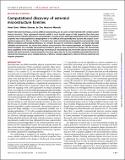| dc.contributor.author | Chen, Desai | |
| dc.contributor.author | Skouras, Melina | |
| dc.contributor.author | Zhu, Bo | |
| dc.contributor.author | Matusik, Wojciech | |
| dc.date.accessioned | 2018-11-05T19:07:19Z | |
| dc.date.available | 2018-11-05T19:07:19Z | |
| dc.date.issued | 2018-01 | |
| dc.date.submitted | 2017-08 | |
| dc.identifier.issn | 2375-2548 | |
| dc.identifier.uri | http://hdl.handle.net/1721.1/118889 | |
| dc.description.abstract | Modern fabrication techniques, such as additive manufacturing, can be used to create materials with complex custom internal structures. These engineered materials exhibit a much broader range of bulk properties than their base materials and are typically referred to as metamaterials or microstructures. Although metamaterials with extraordinary properties have many applications, designing them is very difficult and is generally done by hand. We propose a computational approach to discover families of microstructures with extremal macroscale properties automatically. Using efficient simulation and sampling techniques, we compute the space of mechanical properties covered by physically realizable microstructures. Our system then clusters microstructures with common topologies into families. Parame-terized templates are eventually extracted from families to generate new microstructure designs. We demonstrate these capabilities on the computational design of mechanical metamaterials and present five auxetic microstructure families with extremal elastic material properties. Our study opens the way for the completely automated discovery of extremal microstructures across multiple domains of physics, including applications reliant on thermal, electrical, and magnetic properties. | en_US |
| dc.description.sponsorship | United States. Defense Advanced Research Projects Agency. Simplifying Complexity in Scientific Discovery (N66001-15-C-4030) | en_US |
| dc.publisher | American Association for the Advancement of Science (AAAS) | en_US |
| dc.relation.isversionof | http://dx.doi.org/10.1126/SCIADV.AAO7005 | en_US |
| dc.rights | Creative Commons Attribution-NonCommercial 4.0 International | en_US |
| dc.rights.uri | http://creativecommons.org/licenses/by-nc/4.0/ | en_US |
| dc.source | Science Advances | en_US |
| dc.title | Computational discovery of extremal microstructure families | en_US |
| dc.type | Article | en_US |
| dc.identifier.citation | Chen, Desai, Mélina Skouras, Bo Zhu, and Wojciech Matusik. “Computational Discovery of Extremal Microstructure Families.” Science Advances 4, no. 1 (January 2018): eaao7005. | en_US |
| dc.contributor.department | Massachusetts Institute of Technology. Computer Science and Artificial Intelligence Laboratory | en_US |
| dc.contributor.department | Massachusetts Institute of Technology. Department of Electrical Engineering and Computer Science | en_US |
| dc.contributor.mitauthor | Chen, Desai | |
| dc.contributor.mitauthor | Skouras, Melina | |
| dc.contributor.mitauthor | Zhu, Bo | |
| dc.contributor.mitauthor | Matusik, Wojciech | |
| dc.relation.journal | Science Advances | en_US |
| dc.eprint.version | Final published version | en_US |
| dc.type.uri | http://purl.org/eprint/type/JournalArticle | en_US |
| eprint.status | http://purl.org/eprint/status/PeerReviewed | en_US |
| dc.date.updated | 2018-10-10T16:09:16Z | |
| dspace.orderedauthors | Chen, Desai; Skouras, Mélina; Zhu, Bo; Matusik, Wojciech | en_US |
| dspace.embargo.terms | N | en_US |
| dc.identifier.orcid | https://orcid.org/0000-0003-2336-6235 | |
| dc.identifier.orcid | https://orcid.org/0000-0001-5036-6615 | |
| dc.identifier.orcid | https://orcid.org/0000-0003-0212-5643 | |
| mit.license | PUBLISHER_CC | en_US |
